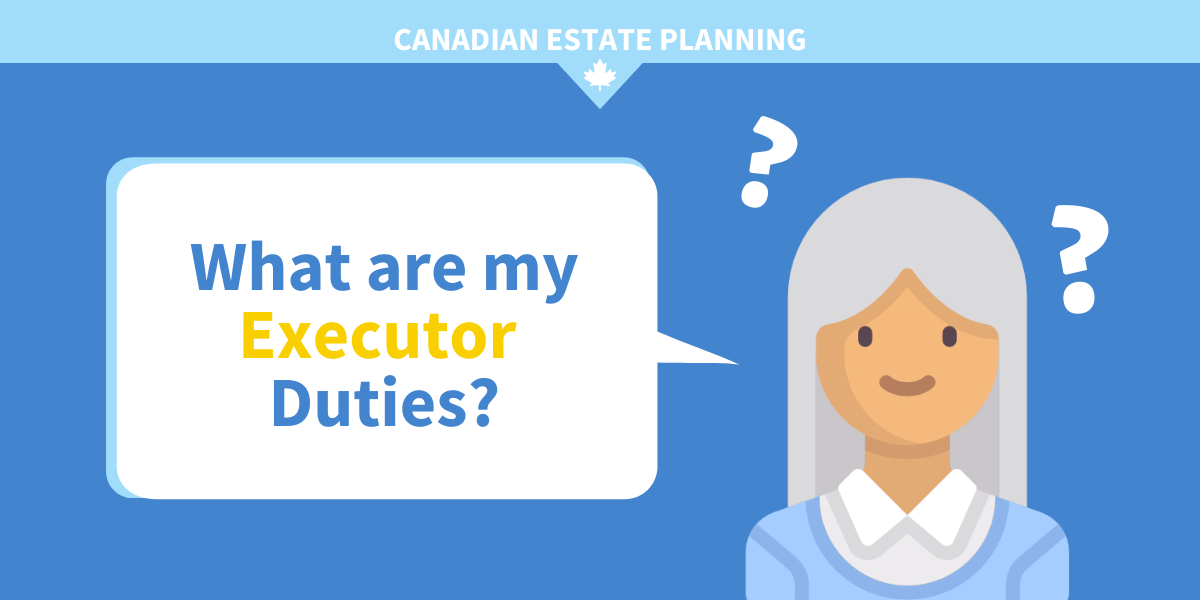
So you’ve been made an Executor, but what does that actually mean?
Your Executor duties are quite extensive (it takes about two years to close an estate in Canada) but not to worry, we have a free Executor Guide that can help you every step of the way.
Want a sneak peek?
You can see the complete** list of your responsibilities below.
**This is a complete list of basic executor tasks only. Each estate is different and may require different actions. For example, one testator could be a small business owner and an organ donor while another is not. Be sure to review your duties and their timeline for completion with a legal professional. Don’t have a legal professional? You can find one here.
Executor Duties:
- Prepare/Organize funeral arrangements
- Arrange care of pets
- Arrange special requests (i.e. organ donation)
- Identify and cover immediate cash requirements (i.e. rent and utilities)
- Publish an obituary
- Obtain the original death certificate
- If they were a sole or controlling shareholder of a business, ensure proper coverage
- Collect important estate information like bank accounts and SIN numbers
- Collect property information and documents like deeds and mortgages
- Review home insurance
- If they owned rental properties, inform their tenants to rediect rent payments
- Obtain keys to any owned property and consider changing the locks
- Collect passwords to social media accounts, subscriptions, email, telephone billing, etc.
- Connect with key contacts like financial advisor, lawyer, and executor liability insurance providers
- Arrange for a review of their investment portfolio
- Review auto insurance
- Create an inventory list of all valuable possessions (jewlery, family heirlooms)
- Review the Will
- Contact and meet with the beneficiaries
- Set up an estate bank account
- If there are any charitable donations specified in the will, notify the organization
- Confirm completion of tax returns for the past 6 years
- Complete the current year’s tax return
- Notify third-parties like Passport Canada and Canada Post
- Contact service providers such as cable to cancel services
- Determine if any personal assets are missing
- Seek legal assistance to help with foreign assets, if applicable
- Evaluate all financial assets with a financial advisor
- Arrange life insurance payments
- Arrange RRSP payments
- Application to the Court for Appointment as Executor (Probate)
- Notify and pay any outstanding creditors and debts using estate funds
- Pay all professional fees involved (financial, legal, etc.)
- Distribute assets to beneficiaries
- Close executor bank account
FAQ
What happens if I make a mistake with my Executor tasks?
You (and any joint Executors of the estate) are financially and legally responsible for any estate administration mistakes that are made and the financial loss that may come from them.
This means another executor, a beneficiary, a creditor, or another party may sue you, and you will have to pay out-of-pocket for legal fees and estate losses – unless you have Executor Liability Insurance.
If estate items go missing, tasks are completed incorrectly, investments are mismanaged, real estate is sold unfairly, or deadlines for certain tasks are missed, unfortunately these are all mistakes for which you would be held responsible. Learn more about the most common causes for estate disputes and how to avoid them.
How does it work if there is more than one Executor?
Joint executors have an equal amount of legal and financial responsibility. Neither one is in charge or holds more authority, they must work together in order to complete executor tasks and often all executor signatures are required for all documents. This situation occurs often with multiple children being made executors of their parents estate. Learn more about acting as joint executors.
Is there a time limit to closing the estate?
It takes two years on average to close an estate in Canada, however if there are complexities such as a business succession plan, international real estate holdings, or estate litigation issues it can take much longer. (It took this Toronto Executor over 10 years and $1 million dollars to close his friend’s estate.)
Who pays for the funeral?
Typically one of three situations happen:
- The deceased has made provisions for their funeral in their will and prepaid.
- The executor(s) temporarily cover funeral costs until they are paid back from the estate (this can take months.)
- If the estate does not have the funds to cover the funeral costs, arrangements are typically up to the discretion of the executor and beneficiaries as they would be covering the cost out-of-pocket.
Pro Tips:- Secure Executor Liability Insurance within the first 30 days of becoming an Executor. (You can download an application here.)
- Make a list of your executor tasks in order of priority – some tasks need to be done by a certain deadline. (Or you can just use our free Executor Guide.)
- Keep a journal of all decisions, actions, and expenses while you are an executor.
- Keep track of all receipts, emails, paperwork, and communications.
- Take inventory of estate assets immediately and store in a safe place. Do not let others take personal affects. They can only be given out after all estate debts are repaid.
Continue Learning
Can I include pets in my will?
How to prepare your executor and your estate
